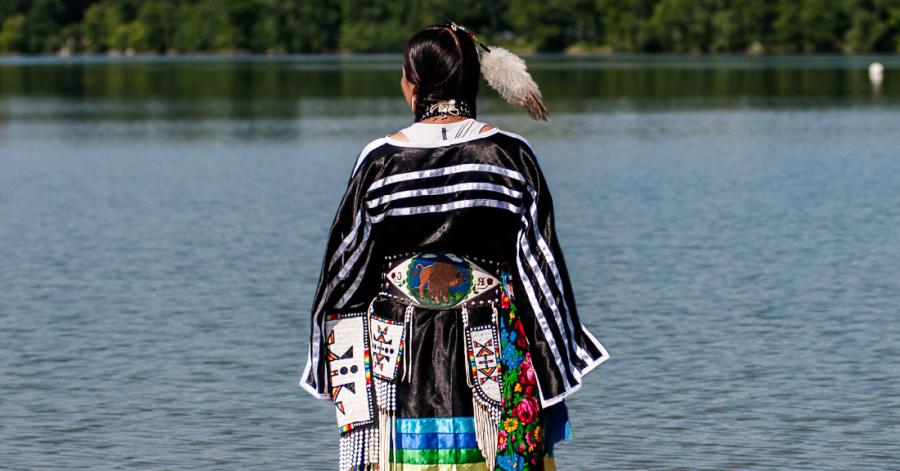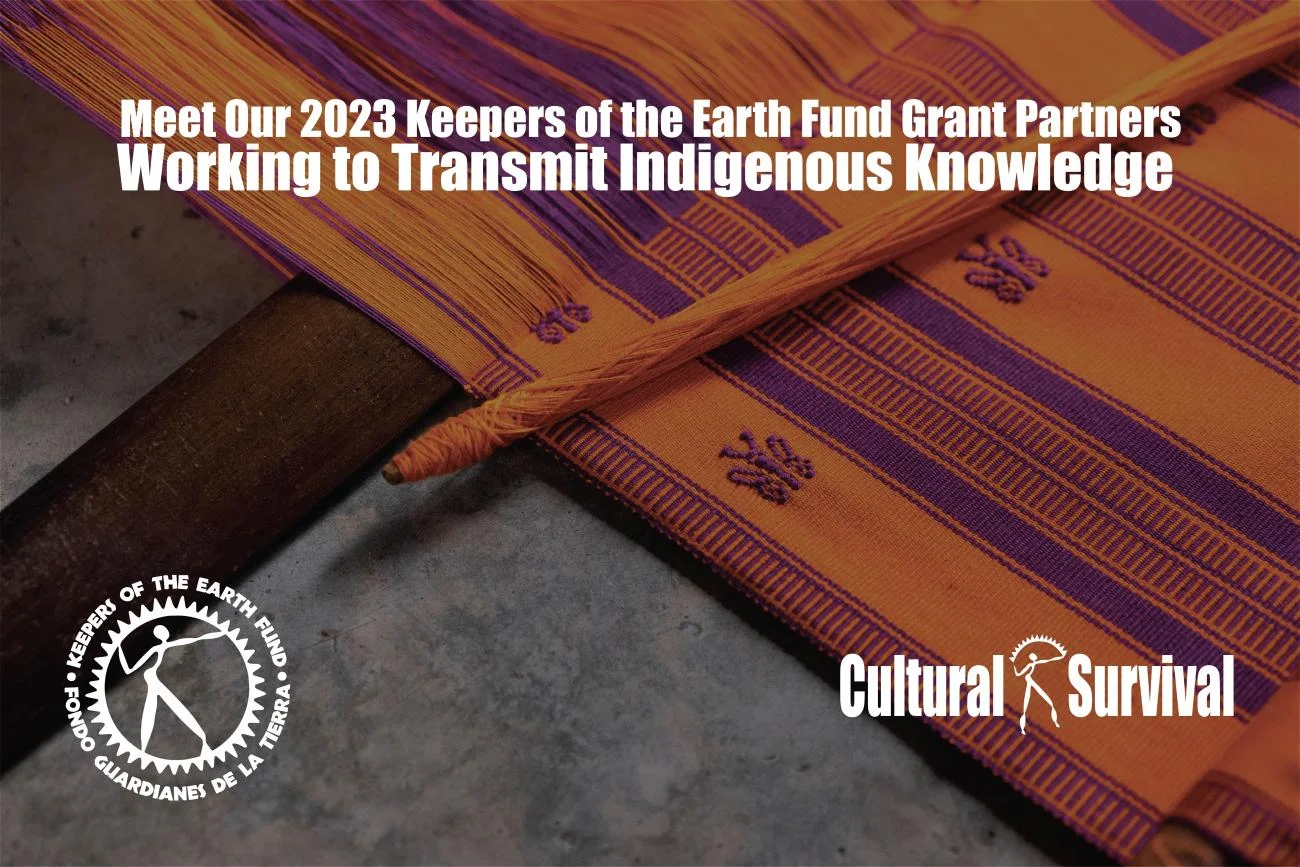
The Keepers of the Earth Fund (KOEF) is proud to announce that in 2023 we awarded over half a million dollars in small grants to support Indigenous projects on issues related to community empowerment for land defense and autonomy; the transmission of Indigenous Knowledge; traditional medicine and Indigenous spirituality; food sovereignty and Indigenous economies; and the various forms of resistance to mining for the energy transition.
In total, 72 Indigenous projects and collectives were financed for a total amount of $543,605. The funds were sent directly to Indigenous communities, collectives, and grassroots organizations in 21 countries.
At Cultural Survival, we value cultivating long-term relationships with our partners. Therefore, we awarded 22 grants to organizations that had received grants in prior years, representing one-third of this year's total. Following our programmatic priority of supporting Indigenous women and youth, 16 organizations led by Indigenous women and 9 projects either led by or directly supporting Indigenous youth were financed.
The Keepers of the Earth Fund is an Indigenous-led fund at Cultural Survival designed to support Indigenous Peoples' advocacy and community development projects globally. Since 2017, we have supported 310 projects in 41 countries through small grants and wrap-around support totaling $1,603,307. Grants go directly to Indigenous communities, collectives, organizations, and traditional governments to support projects designed by them and in accordance with their Indigenous values. Predicated on the United Nations Declaration on the Rights of Indigenous Peoples, Cultural Survival uses a rights-based approach in our grantmaking strategies to support grassroots Indigenous solutions through the equitable distribution of resources to Indigenous communities.
Meet our grant partners who are working to transmit Indigenous Knowledge to younger generations.
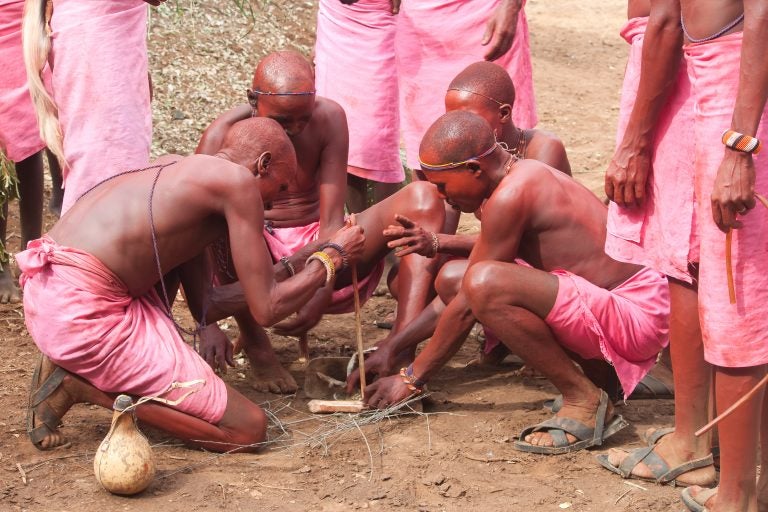
Jamii Asilia Centre (JAC) and Global Wisdom Collective - (Endorois), Kenya
Jamii Asilia Centre and Global Wisdom Collective are Indigenous-led organizations in Nakuru, Kenya, currently working on digital documentation of the Endorois culture. The displacement of Endorois Peoples due to the establishment of Lake Bogoria National Reserve by the government threatens their culture and traditions. Global Wisdom Collective and Jamii Asilia Center are jointly leading this project around protecting the indigenous knowledge systems of the Endorois people. By conducting a series of interviews with local Elders, documenting historical sites, traditions, and knowledge, and creating a digital archive of the documentation, their goal is to alleviate the gap that Western culture has created between the youth and Elders. To ensure the sustainability of this project, Indigenous youth are being trained to operate and maintain the digital archive.
Tuteayen tse sungün - (Mapuche Wiliche), Chile
Tuteayen tse sungün is an organization of Mapuche Wiliche women who live in the Willimapu territory and speak tse sungün, a linguistic variant of the Mapuche in southern Chile that has been weakened by cultural and identity dispossession caused by political and economic oppression. The group has been working towards language revitalization in the community since 2020. With a grant from the Keepers of the Earth Fund, a language immersion boarding school will be created to train speakers at different levels so that they can be future teachers of their language.
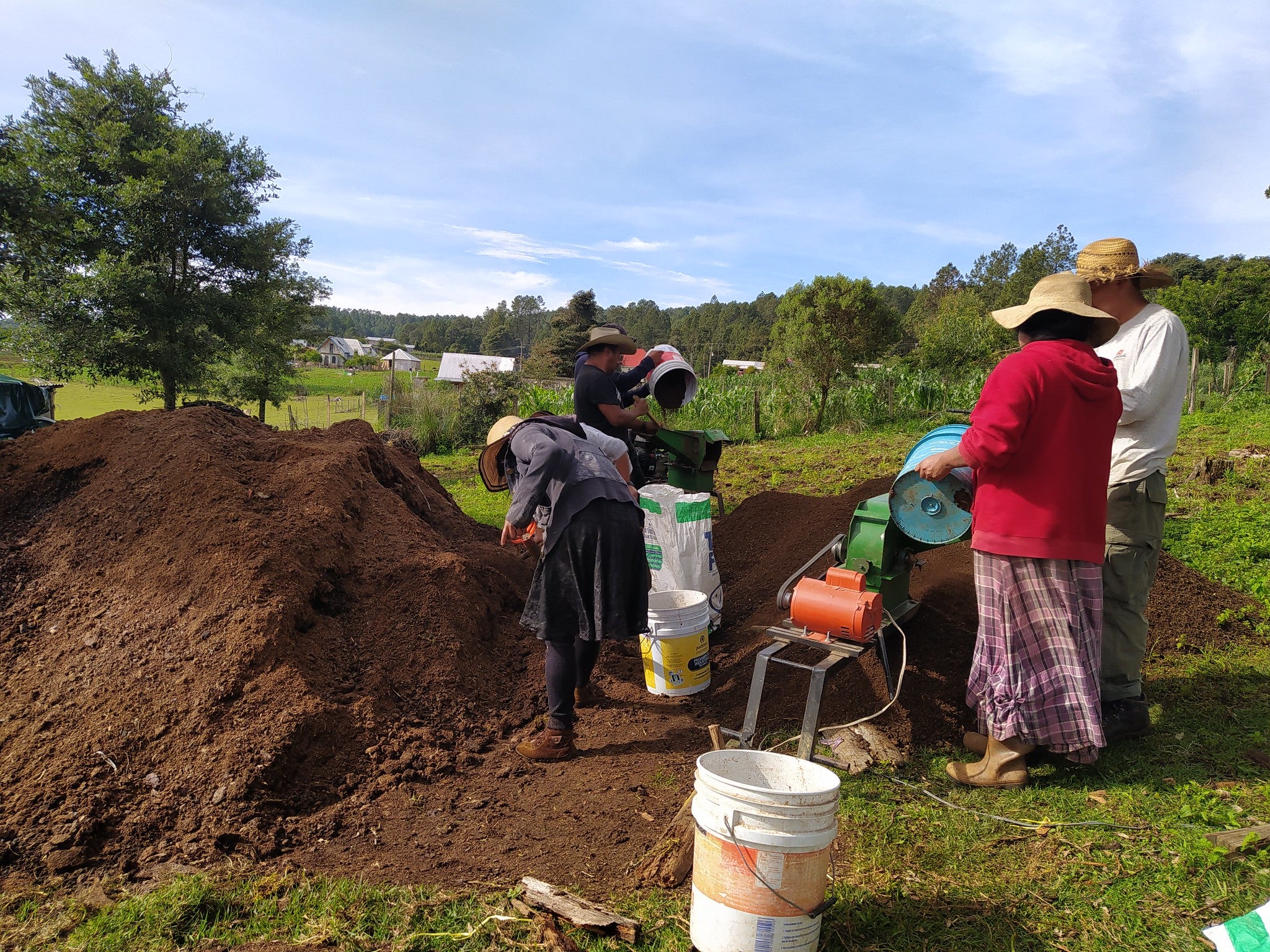
Yimom Collective- Healing Women - (Maya Tsotsil), Mexico
Raising sheep is an important activity for Ttsotsil way of life of the Chamo' Peoples, who use wool to make their traditional clothing and sell it as a raw material to outside buyers. Additionally, sheep manure serves as fertilizer and nourishes traditional food systems. The Yimom Collective, made up of Maya Ttsotsil mothers, daughters, and granddaughters, is working on an infrastructure project for raising sheep and improving resting and grazing conditions. They also seek to create spaces for dialogue with other women to share knowledge about breeding, feeding, and deworming and the types of wool and the art of working with it, ultimately strengthening their community-run economies.
Association of Merchants of the Pataxó Indigenous Park of the Coroa Vermelha Village (ACPIPA) - (Pataxó), Brazil
The Pataxó Indigenous Museum is linked to the Association of Merchants of the Coroa Vermelha Indigenous Park in the General de Coroa Vermelha village in the state of Bahia. The Pataxó Museum sought to protect and disseminate their culture; however, the project, which had been run by the State, was shut down. In 2023, the Merchants Association tried to reopen the museum, which had been cataloging cultural, symbolic, linguistic, and territorial elements belonging to their community. Their objective is to tell their histories under a new Pataxó-led leadership and from a decolonized perspective.
San Diego Agricultural Institution - (Pasto), Colombia
The San Diego Agricultural Institution is located in the Muellamues Indigenous Reserve in the Department of Nariño. It was founded to make basic secondary education accessible so that young people can study close to their homes and community. With the support of the KOEF grant, the school will continue its long-time project of building an ancestral house. The house will serve as a space for the intergenerational strengthening of Pasto culture and identity.
Indigenous Cultural Association from the Peoples (ACIP) - (Lenca), Honduras
Much of the lands of the Lenca Peoples have been bought up by migrant settlers from other areas for use as coffee monocultures. ACIP, with the support of the Keepers of the Earth Fund, seeks to establish a network of agroecologists to promote and develop science rooted in ancestral Lenca knowledge. In addition, some spaces will be expanded to be used as bedrooms, offices, and a warehouse in support of the activities of the Indigenous University of the Peoples, an institution co-created by ACIP and community leaders as a decolonizing project that promotes buen vivir (good living).
Runapacha Collective - (Inga), Colombia
In the community of Santiago, Putumayo, the Inga language is threatened. The youth and children of the community no longer use it, and migrant families returning from Venezuela have lost it. With the support of the KOEF grant, the Runapacha Collective will create didactic tools that promote meeting around and learning the Inga language and chumbe (artisan weaving). They are developing a series of guide cards with the symbols of the fabric. In addition, knowledge mingas (gatherings), workshops, and intergenerational dialogues will be held with the guardians of oral tradition.
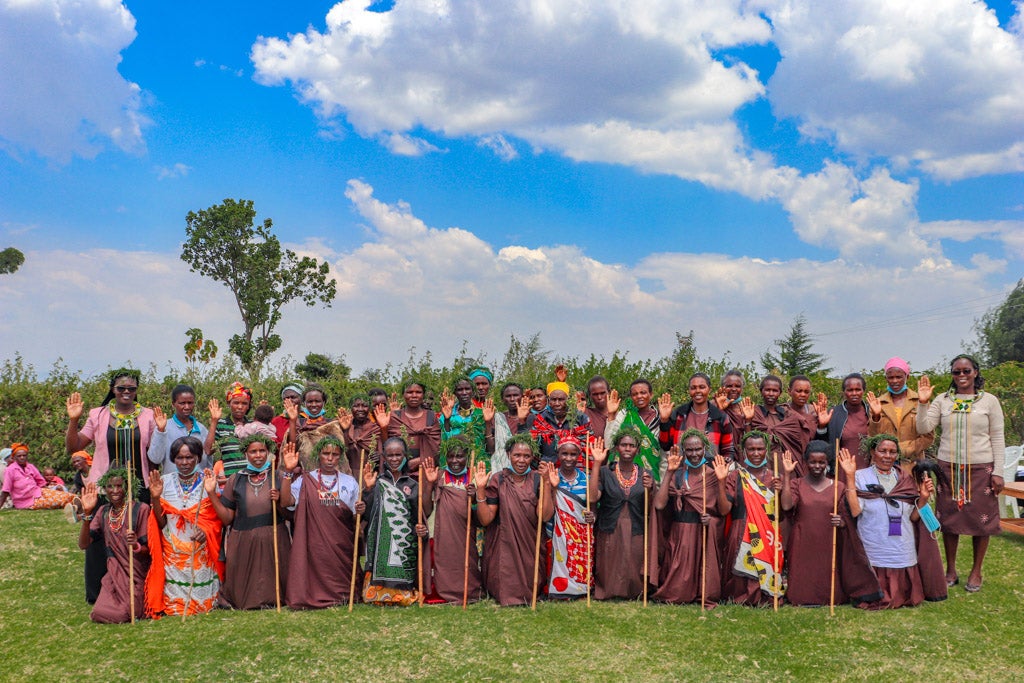
Ogiek Peoples’ Development Program - (Ogiek), Kenya
In Nakuru, Rift Valley, Ogiek lifeways and language are threatened by assimilation and eviction activities led by the State. Ogiek Peoples' Development Group is an Ogiek-based Indigenous organization that aims to promote and strengthen Ogiek culture. The project, which is funded by a KOEF grant, will establish a museum to collect artifacts documenting Ogiek Traditional Knowledge and associated assets via video and printed materials. To ensure the transmission and sustainability of the Ogiek language, they will develop a curriculum for the youth including an essay contest and a theater performance. The goal of the project is to create a central space where Ogiek knowledge, language, and culture can be expressed to support intergenerational transfer of knowledge.
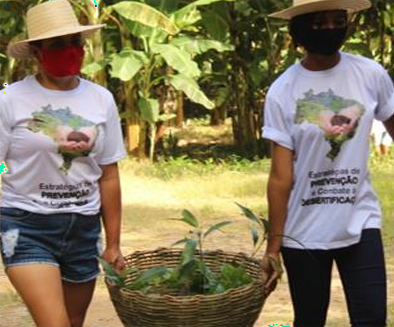
Association of Karão Jaguaribaras Peoples - (Karão Jaguaribaras), Brazil
The Association was founded in 2004 in Feijão village, Aratuba, northeast Brazil. Many of the languages and cultures in this region are at risk due to colonization. In response to this problem, the Association is building a communal space for a Ybutritê language teaching and learning laboratory that will support language revitalization for the younger generations as well as strengthen the cultural identity of the people.
Kimi Ndii - (Mixtec), Mexico
The Kimi Ndii collective was created in 2011 by a group of textile and pottery artisans in Santa María Cuquila in the Mixteca region. Due to the loss of teachers in the community with knowledge of the arts and the lack of spaces and programs to strengthen the Ñuu Savi identity, Kime Ndii hosts presentations and workshops to maintain and revitalize traditional textile and clay techniques. This year, with a grant from the Keepers of the Earth Fund, their work will be strengthened.
Regional Organization of Indigenous Peoples of Zulia State (ORPIZ) - (Wayuu), Venezuela
ORPIZ was created in 1995 during the First Congress of Grassroots Indigenous Peoples of Maracaibo, Zulia state. It is composed of organizations and communities of the Añu, Bari, Japreria, Yukpa, and Wayuu Peoples. Due to extreme poverty experienced by the communities, a Wayuu sustainable economic entrepreneurship project was launched with the production of handbags made of recycled material. The intention is to transfer the ancestral katto'üi technique to children and young people. In addition, plastic bag recycling campaigns are being carried out in schools and training meetings are being organized in the use of information technology for Wayuu youth and children, where content is created with messages about cultural memory, the Wayuunaiki language, and stewardship of Mother Earth.

